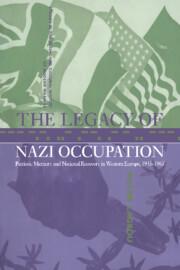Book contents
- Frontmatter
- Contents
- List of illustrations
- Acknowledgements
- List of abbreviations
- Introduction
- Part I Troublesome heroes: the post-war treatment of resistance veterans
- Part II Repatriating displaced populations from Germany
- Part III The legacy of forced economic migration
- 7 Labour and total war
- 8 Moral panic: ‘the soap, the suit and above all the Bible’
- 9 Patriotic scrutiny
- 10 ‘Deportation’: the defence of the labour conscripts
- Part IV Martyrs and other victims of Nazi persecution
- Conclusion
- Bibliography
- Index
8 - Moral panic: ‘the soap, the suit and above all the Bible’
Published online by Cambridge University Press: 02 December 2009
- Frontmatter
- Contents
- List of illustrations
- Acknowledgements
- List of abbreviations
- Introduction
- Part I Troublesome heroes: the post-war treatment of resistance veterans
- Part II Repatriating displaced populations from Germany
- Part III The legacy of forced economic migration
- 7 Labour and total war
- 8 Moral panic: ‘the soap, the suit and above all the Bible’
- 9 Patriotic scrutiny
- 10 ‘Deportation’: the defence of the labour conscripts
- Part IV Martyrs and other victims of Nazi persecution
- Conclusion
- Bibliography
- Index
Summary
The archives of Frénay's services in Algiers offer a fascinating window on how Western European workers in Germany were perceived. A voluminous report reached Algiers on 25 August 1943 – that is, even before Frénay took office – consisting of edited excerpts from correspondence with French and Belgian workers in Germany (part 1) and French workers working in France for the German organisation Todt (part 2). The report was probably transmitted by Gaullist agents in Vichy. It offers a balanced view of the workers’ material living conditions, pointing out the very favourable conditions enjoyed by workers employed in family businesses or on the land, and adding that even for workers in the industrial centres material conditions were often ‘very adequate’. In its section on the nature of the forced labour it goes to great lengths to show that the main complaint of the workers was not physical exhaustion due to the strenuous nature of the work, but rather the boredom of long and idle hours in the factory and the frustratingly slow pace. The main, and in many cases obsessive, focus of attention for the authors of the report is the moral conditions. In the introduction they warn that, even if the material conditions are satisfactory, ‘this mass of more than one million – or, including the foreigners, more than ten million – workers is doomed to an extraordinary moral decay, the consequences of which are incalculable’.
- Type
- Chapter
- Information
- The Legacy of Nazi OccupationPatriotic Memory and National Recovery in Western Europe, 1945–1965, pp. 144 - 156Publisher: Cambridge University PressPrint publication year: 1999

